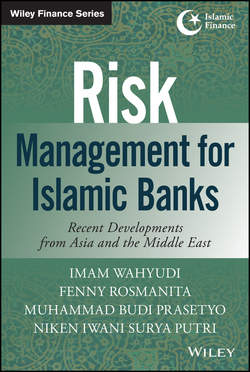Читать книгу Risk Management for Islamic Banks - Imam Wahyudi - Страница 14
На сайте Литреса книга снята с продажи.
Part One
Introduction
Chapter 2
The Islamic Bank and Risk Management
Differences between an Islamic Bank and a Conventional Bank
ОглавлениеThe concept of Islamic banks exists in the middle of the frenetic pace of conventional banking practice, in which these two business entities have different principles. In fulfilling the intermediation function, conventional banks use as a basis the interest rate, both from the asset side and the liability side. Because syari'ah prohibits the application of interest, various modes of financial transaction not involving interest were developed. This prohibition of interest is comprehensive in nature, covering funding, financing, products, and services. This interest system is replaced with a profit–loss sharing system. This profit-sharing system is applied in investment contracts (i.e., mudharabah and musyarakah).
On the funding side, conventional banks reward depositors with a certain level of interest, and thus the return of the funds kept is already predetermined at the beginning of the contract. This is different from Islamic banks, which reward depositors based on a ratio (nisbah) predetermined at the beginning of the contract between the bank and depositor. As the return is divided according to the profit received by the bank during the investment period, the precise amount cannot be predicted beforehand. For products of credit or loan, conventional banks use interest-bearing instruments to channel third-party funds. In channeling third-party funds in the form of financing, Islamic banks can use a profit-sharing system, asset leasing, or sale-based contracts. In a profit–loss sharing system, other than sharing profit based on an agreed-upon ratio (nisbah), there is also a sharing of risk. This is different from methods involving the conventional bank, in which the whole loss is borne by the entrepreneur or borrower.
An Islamic Bank Deals in Real Goods or Services, Not in Money
According to an Islamic perspective, money functions only as storage of wealth and a medium of exchange, not as a tradeable commodity. Because of this, Islam prohibits the sale of money with money in deferred payment/goods delivery, because this is part of usury. Money cannot be sold for a profit. With the lack of interest over loans, Islam offers a solution in the form of interest-free financial products. The transaction can be in the form of sales, profit sharing, or leasing. In sale contracts, the goods sold are real goods.
In a profit-sharing contract, the business receiving the financing should also produce real goods and services and have viable future prospects. Even more important is to change the paradigms of the bankers; in conventional banking methods, the bankers only consider how to locate prospective financing payments, finance those proposals, and ensure that the bank's funding channeled by the bank will be returned along with a predetermined rate of return. When a proposal is approved and funded, the bankers are more focused on capital recovery than on ensuring that the debtors' businesses have developed according to their expectations. Why does this happen? Because the success of the debtors will not impact the return that they will receive; the bankers will only receive the return in terms of the interest rate that is predetermined at the beginning of the contract. Because of this, the bankers have no real incentive to help develop the debtors' businesses. The bankers' only concern is in recovering the principal of their loan along with its interest. They only enter into an assistance process and intensive oversight when any of the debtors' businesses experience trouble. Once more, the motivation here isn't to ensure the debtors' businesses overcome their troubles and experience success, but only to ensure the return of the bank's capital and its interest. This way of thinking is one that should be eliminated once a banker has crossed over (hijrah) to the Islamic banking system.
The same beneficial effect to society should also apply to lease contracts: the object being rented should be a real object and capable of being handed over. The renter receives benefit (usufruct) from the object being rented. In Islamic finance, the ijarah contract (leasing) entered into by the bank can only be of the form of operating lease, not of capital lease. With regards to the asset, the bank can either own the asset whose benefit (usufruct) will be rented out, or the bank could enter into an ijarah contract with the first party, to then rent it out to the second party (this is called a parallel ijarah) as long as the first party does not stipulate that the asset cannot be entered into a second ijarah contract.
